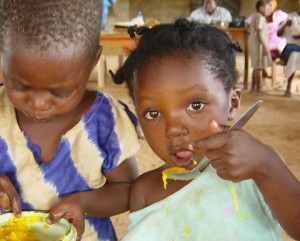30 Years of CRSP Research on Animal Source Foods and Child Cognitive Development: A Presentation by Montague Demment
 Montague Demment, Associate Vice President for International Development at the APLU and former Director of the Global Livestock CRSP spoke on “Animal Source Foods and Child Cognitive Development: A USAID Success Story of University Research to Private Sector Implementation.” The presentation on Nov. 14th was organized by Agrilinks and was well-attended by USAID staff members and others interested in nutrition research and programming.
Montague Demment, Associate Vice President for International Development at the APLU and former Director of the Global Livestock CRSP spoke on “Animal Source Foods and Child Cognitive Development: A USAID Success Story of University Research to Private Sector Implementation.” The presentation on Nov. 14th was organized by Agrilinks and was well-attended by USAID staff members and others interested in nutrition research and programming.
Demment highlighted how the CRSP activities have helped to bridge the gap between human nutrition and livestock research. His presentation reviewed the chronology and significance of research findings on the role on Animal Source Foods (ASFs) in human nutrition – particularly on child nutrition and cognitive development – that resulted from the Human Nutrition, the Small Ruminant, and Global Livestock CRSPs. In the 1980s the Human Nutrition CRSP conducted an observational survey study in Kenya, Mexico, and Egypt to address the question of how moderate malnutrition impacts human function. The results of the study showed that the quality of food consumed mattered more than quantity and that the consumption of ASFs was the best predictor of cognitive function. The Small Ruminant CRSP conducted a follow-up intervention study in one of the same initial Kenyan communities years later, collecting data on over 1,000 children over five years. Data showed that children who regularly ate meat scored approximately 20% higher on Raven’s test (a culturally blind intelligence test), spent more time in leadership behaviors, and had a greater percentage increase in active time than children who did not regularly eat meat. Later research conducted under the Global Livestock CRSP’s ENAM project in Ghana determined that the biggest barriers to getting meat into a child’s diet were a lack of income and lack of understanding of the nutritional needs of a child and benefits of ASF. In response to these findings, women’s groups received both nutrition education and business development training, allowing them to start their own income generating activities.
In addition to the nutrition impacts for the participants’ families, the project successfully created a partnership with Heifer International and rural banks. Over US$2 million has been loaned by Ghanaian banks to women’s groups. Since the end of the CRSP project, the number of women’s groups has continued to grow. Members of the women’s groups report using their profits to enroll their children in private schools.
Julie Howard, Chief Scientist of the Bureau for Food Security at USAID, in introducing Dr. Demment, credited him with adding a nutrition focus to USAID’s agricultural research programming under the GL CRSP. This focus has been expanded in USAID’s Feed the Future (FTF) initiative, which has now put food security and agricultural research back on the development agenda. The FTF initiative has incorporated greater attention to nutrition, a renewed interest in investing in livestock-based activities, and increased recognition of the valuable partnership between U.S. universities and USAID in development work.
Resources and presentation materials from the event are available on Agrilinks. Highlights from the event can be found on the Agrilinks Blog. To view a video on the ENAM project click here.
